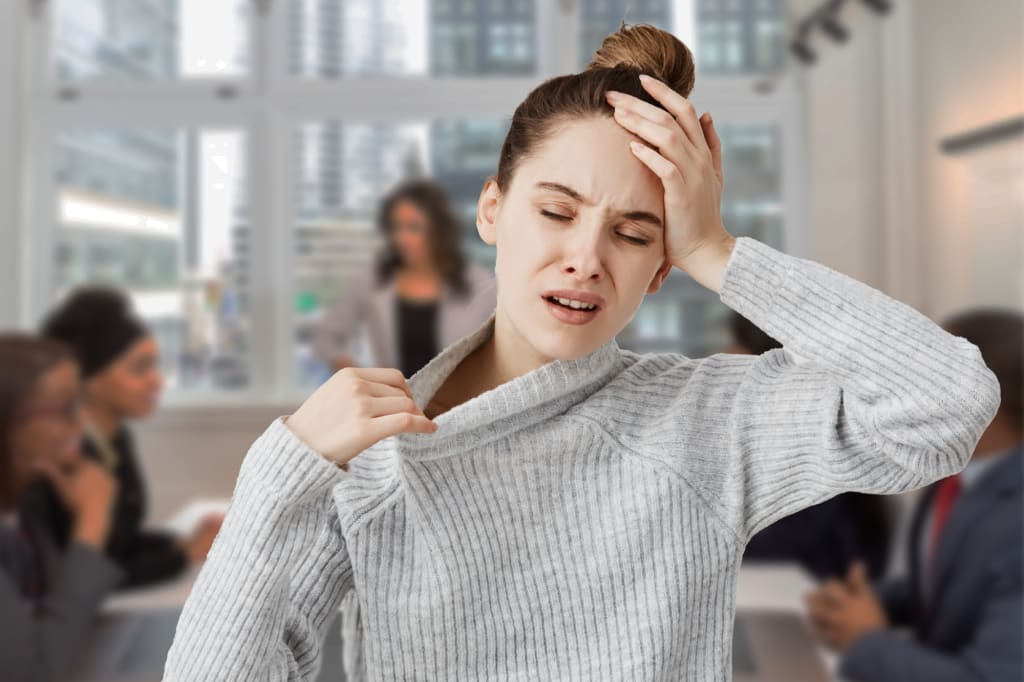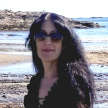Is It Hot in Here??
Natural Remedies to Reduce Hot Flashes

Three things I used to believe about hot flashes that turned out to be untrue:
- They can't be that bad! ("So, you get a little warm. Just dress lighter, or turn on a fan. It can't be that disruptive!")
- It only happens when you're "old"
- There's nothing you can do about hot flashes besides HRT (hormone replacement therapy)
---
Oh, how wrong I was!
I humbly apologize to all those women who, in my younger years, I secretly labeled as "drama queens", eyeing them cynically as they frantically fanned themselves, cringing as they announced to everyone in earshot, "OMG! Sorry, but I'm having a hot flash!"
---
Debunking misconception #1
A full-out hot flash is a truly miserable experience, especially when it happens in a crowd of people - like in line at the grocery store - and you're unable to just tear off all your clothes and stand in front of a fan.
(They frown on that at my local supermarket.)
It feels like your entire body is being engulfed in flames, a furnace ignited in your core. Your face turns a mottled red and you break out in a sweat. Not fun.
Then you stress out because people are looking at your beet red, perspiring face, wondering what the heck is wrong with you... especially if it's freezing outside!
Turns out… being stressed makes your hot flash even worse. You feel the blood surging through your body, pounding in your ears and your head sweats. You have an uncontrollable urge to lift the hair from your neck because your ears are sweating (seriously)
The more upset you get about having that hot flash now, in front of your co-workers, or your accountant, the worse the symptoms become, until you might even feel nauseous, fearing you might vomit on someone's shoes.
It's true - I speak from personal experience. A hot flash can be so strong as to upset your stomach, and make you feel dizzy or faint.
Debunking misconception #2:
Hot flashes don't only happen to "old" women.
I started suffering hot flashes and night sweats at barely 41.
I seriously thought I was ill, not associating the term "hot flash" with what I was experiencing, especially since I was still menstruating. My doctor had to clue me in - hey, dummy, you're not dying, that's just a hot flash!
Although the average age for perimenopause is 51, it can begin in your late thirties or early forties, (occasionally even earlier - yikes!) while your menstrual cycle is still kicking your butt every month.
Oh, joy.
So you don't even get to celebrate the end of that discomfort and inconvenience (the one you've been plagued with since junior high) before you embark on "Womanhood Phase 2 - The Gates of Hell".
Debunking misconception #3:
HRT is not the only solution.
After five months of suffering horrible hot flashes that made me feel miserable most of the time, I begged my doctor for relief.
I wasn't sleeping, I was dragging myself through each day feeling vile: sweaty, irritable, depressed, with a constant headache.
Hot flashes/night sweats were seriously affecting my quality of life.
I talked to my doctor about HRT, but decided that for me, personally, the risks were too great.
So , if not HRT, then what??
Combining a few suggestions my doctor made with my own research and two years of trial and error, this is what I've discovered.
These things work for me and may work for you, to help keep those hot flashes at bay.
---
Foods that Help
Hot flashes happen because levels of estrogen are on a roller coaster ride during perimenopause. Fluctuating hormone levels mess with your body's ability to regulate core temperature, and can also cause your blood vessels to bounce back and forth between constriction and dilation, which results in that surging feeling of blood rushing to your face, head and chest (and sometimes other areas, too!)
Phytoestrogens
To help regulate your estrogen levels, try eating foods high in phytoestrogens, a plant hormone which mimics the effect of a woman's natural estrogen (although in a weaker form).
- soybeans
- chickpeas
- lentils
- flaxseed
- garlic
- beans
Mediterranean Diet
A study published by the National Institute of Health in 2013 found that a Mediterranean diet (containing fresh vegetables, fruits, whole grains, beans, seeds, olive oil and red wine) seems to go a long way in reducing hot flashes.
In this study, women who followed the Mediterranean diet were 20% less likely to suffer hot flashes and night sweats.
Iron & Folic Acid
Leafy greens containing iron and folic acid may benefit those suffering from hormonal fluctuations.
"Kale, spinach and other leafy greens promote healthy blood sugar levels and provide the body with antioxidants, which helps in stabilizing estrogen levels." -Muhammad Mirza, MD, medical director of Doctor Available, LLC, in Clifton, NJ.
Certain Fruits
Pineapple, strawberries, and melons like cantaloupe or honeydew may help curb your hot flashes, according to Dr. Brad Crump of Red Mountain Resort in Utah.
"Vitamin C has hormone stabilizing properties, and can help regulate blood sugar levels, both of which can curb hot flash frequency."
Foods to Avoid
- sugar - can cause a spike and then a dip in blood sugar levels, which can lead to fluctuations in hormone production
- caffeine - increases your heart rate and dehydrates you, both of which can cause hormone levels to fluctuate
- alcohol - although 2–3 glasses of red wine per week is thought to be beneficial, alcohol consumption in general causes blood vessels to dilate, and may contribute to hot flash frequency
- fats - a study by NIH found that high-fat diets were among the most likely to be linked to frequent hot flashes and night sweats
---
Additional Tips
- De-stress - Stress causes a surge in epinephrine, which triggers hot flashes, so keep your cool to stay cool! Try meditation, deep breathing exercises, cuddling a pet, or walking in the woods.
- Sleep cool - The best thing I ever did was to invest in some cooling sheets. I sleep on Peachskin Sheets, "made of a moisture-wicking fabric that draws moisture away from your skin". They really helped to curb my night sweats. A little pricey, though.
Also, avoid alcohol or caffeine before bedtime, as both beverages can make you feel warm.
- Stay hydrated - Hot flashes and night sweats can both dehydrate you, leading to chronic headaches. If you're experiencing "the change", it's important to start drinking more water
---
I hope you find relief by incorporating some of these ideas into your own life.
Although perimenopause is a challenging time to get through, try to remember…this too will pass!
---
https://health.clevelandclinic.org/what-to-eat-when-you-have-hot-flashes/
https://pubmed.ncbi.nlm.nih.gov/23553160/
https://my.clevelandclinic.org/health/articles/15223-menopause-non-hormonal-treatment--relief-for-hot-flashes
https://www.womansday.com/health-fitness/womens-health/advice/g1406/how-to-prevent-hot-flashes/?slide=1
About the Creator
Shell St. James
Shell St. James is a New England author living in an 1895 farmhouse with her musician soulmate, feline muse, and a benevolent ghost. Her novel, "The Mermaid of Agawam Bay", is available on Amazon. Find out more at www.shellstjames.com






Comments
There are no comments for this story
Be the first to respond and start the conversation.